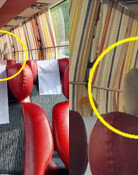Kim Dae-jung Presidential Library unveils Kim’s audio clip
Kim Dae-jung Presidential Library unveils Kim’s audio clip
Posted August. 18, 2020 07:29,
Updated August. 18, 2020 07:29

“A conscience that does not take action is on the side of evil after all,” cried out Kim Dae-jung on April 19, 1975 despite strict surveillance by the Yushin regime. The 51-year-old politician was speaking at a lecture celebrating the fifth anniversary of the first publication of monthly magazine “The Sound of Seeds” by Ham Seok-heon. During a lecture Kim gave for the first time in Korea after being kidnapped in Tokyo in August 1973 and survived a murder attempt, he preached “a conscience that does take action,” which later became a phrase that symbolizes himself.
Marking the 11th anniversary of Kim Dae-jung’s death (Aug. 18), the Kim Dae-jung Presidential Library and Museum of Yonsei University unveiled a two minute and five second long audio clip, where Kim speaks about “a conscience that takes action,” from a full 185-minute audio clip. It was the first and the last time that former President Kim Dae-jung publicly addressed citizens under the Yushin regime. “Looking on is the greatest shame and being obsequious is the greatest sin,” Kim said. “I guarantee that our democracy will be restored in the near future if we all take action as one.”
The phrase, “a conscience that takes action,” which sent ripples across the country, was first used in an ad titled, “I appeal to the people of Korea; Let’s protect Dong-A” placed by Kim Dae-jung on the bottom of the front page of the March 8 edition of The Dong-A Ilbo. At a time when the regime’s oppression against the Dong-A Ilbo continued since 1974, former President Kim appealed to the people to help and support the Dong-A Ilbo, saying, “A conscience that does not take action is on the side of evil after all.”
Unveiling the audio clip on Monday, the Kim Dae-jung Presidential Library and Museum said “a conscience that takes action” is an encapsulation of former President Kim’s assertion that resistance against dictatorship should not be done only in heart but should lead to actual action.
warum@donga.com







